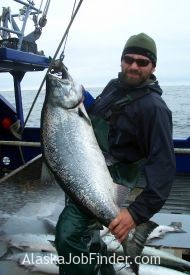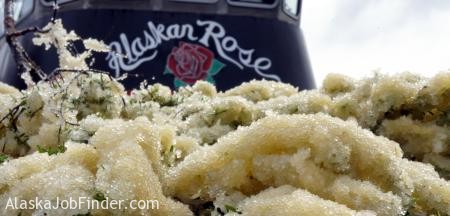Alaska Herring Fishery Jobs Interview
It’s a bit risky but fast-paced and often very lucrative. The herring fishery in Alaska provides great income for many purse seiner skippers, owners, and crew. What better way to learn about the fishery and working on a seiner than from a veteran? Find out about purse seining, risks and rewards, and more in this exclusive two-part interview.
Want a Lot More Great Information Like This?
What’s your background?
I am originally from Ohio, where I went to Miami of Ohio. While attending college in 1995, I made my way to Petersburg, Alaska, and worked in the cannery for the summer.
My college roommates convinced me that it would be a great experience, so I decided to travel with them.
I worked on dock crew that first season and fell in love with Petersburg and fishing boats. It wasn’t until I graduated in 1997 that I made my way back to Petersburg to find a boat job. The rest is history.
How much experience do you have in the Alaskan Seafood Industry?
I guess you could count 1995, but I rarely do. I have been commercial salmon fishing consecutively for the last 15 summers in Alaska.
What made you want to work in the Alaska fishing industry?
It was really a matter of traveling. I could work in the summer and travel during the fall. Of course, this schedule lends itself to ski bums. So, I have skied every winter since 1998, as well.
What are your specific duties aboard the vessel?
I am a skiff man. My job is to tow the lead end of the net into the school of fish and bring it back to the boat. Once the net is pursed up, I am responsible for towing the vessels in a circle to prevent the net from collapsing
What roles do others play on the vessel?
During herring, one of the most important jobs is the sonar guy. His job is to tune into the large schools of herring and to tell the captain when and where to set. The captain is basically there to maneuver the vessel and avoid collisions with competing boats. The deckhands are responsible for stacking and setting the net.
What are the most challenging aspects of your job?
Long hours towing the boat around. One season I towed the boat for 18 hours straight, while we pumped out a massive set of herring. When the morning finally came, I was so relieved. I also knew that the massive set was a huge payday, as well. That’s probably what kept me going.
What are the terms of employment for crew?
Crew are expected to maintain the vessel and perform whatever duties are asked of them. Once you are on the boat, you are "on call," until further notice.
How is net pay determined?
Crew are paid a percentage of the catch after all expenses are taken out.
What questions do you like to have answered before you’ll hire someone?
The obvious questions are drug abuse and criminal back ground checks. In general, the captain will feel out the greenhorn with the rest of the crew and determine if this guy will work out or not.
What kind of advice do you give first-time crewmembers after they’re hired and before you go fishing?
You have to be willing to listen and realize that its not a democracy. Whatever the captain says, goes! It’s very likely that you will get yelled at. And undoubtedly, you will be pissed at the captain at some point. Working through those issues and realizing that its only a couple of months will be your saving grace.
At some point, you will probably hate what you are doing. The long hours tend to wear anyone down. Basically, you will need perseverance to get through the tough times. Keep your head up!
Describe the living arrangements and how difficult it is to deal with sharing space, living in a small accommodation.
In general, purse seiners are 58 feet and the crew all sleep together in the fos’cle, which is basically the bow of the boat with bunks on either side. Most guys are tired and smelly by the time they make it to their bunks. It’s not surprising to see someone in the same clothes for a number of days. Hygiene can be a little lacking, but most boats have working showers and laundry is one of your main town attractions.
Herring Roe Harvest
Describe the typical ‘greenhorn’ experience. From your experience, what can they expect in the way of treatment, pay, etc.?
Greenhorns are typically the whipping post for the rest of the crew. It’s frustrating to know that some idiot is going to get paid as much as you. Especially, when you are doing all the work.
Personally, I enjoy greenhorns because you get to see the freshness in their experiences. Typically, it’s a guy that has only fished a couple of years that give the greenhorns the hardest time. If they are really stupid, it can be a freakin’ nightmare. Luckily, I haven’t dealt with too many over the years. I prefer to be on an experienced crew.
On the occasions you have down time, how did you and the crew spend it?
Herring fishing typically has a ton of down time. Mostly crews mingle at the bar or hang around the boats shooting the sh**! Of course, there is always time for a hike in southeast Alaska. The tongass national forest covers most of this region and hiking in this environment is amazing. Most boats have a kayak or zodiac for water adventures, as well.
Would you recommend this line of work to others, and if so, then why?
Yes! I believe it builds character and it’s a great lifestyle. So many people are indoctrinated in this world and live an existence based on a time card. This is one of the last true freedoms in our world. It’s a blessing to someone that can understand these principles.
What personal benefits/rewards do you find from working in the Alaska fishing industry?
As I said, it’s really a lifestyle to me. I now live in southeast and I’m excited to take my children fishing with me someday. It really has become everything to me. I wouldn’t know what to do I wasn’t living and fishing in southeast alaska.
Some might think it’s a male dominated industry. Tell me about opportunities for women to work on fishing boats.
Some of my best crew members have been women. I believe that it creates a better social dynamic all the way around. Guys seem to be a bit more civilized when there is a woman onboard.
Use AlaskaJobFinder to help your find your dream job. There are hundreds of open jobs right now. Simply click the button below to start your job search.

